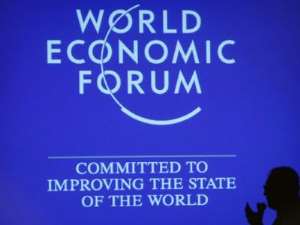
London, Jan. 19, GNA - Zimbabwe and South are two African countries that are focusing on the 48th World Economic Forum (WEF) scheduled January 23 to 26 in the Swiss ski resort of Davos, as they look to bolster their economies.
For Zimbabwe, after the departure of Robert Mugabe, the new President, Emmerson Mnangagwa, will be in attendance as he tries to revive his country's moribund economy.
But his advisers are not expecting huge investments until after the elections in August.
In the case of South Africa, Jacob Zuma will be absent for the first time since he became president in 2009 to be represented by Vice President Cyril Ramaphosa, who was recently elected leader of the ruling ANC.
Eexperts say the African countries will focus on the issue of providing electricity for the continent where 645 million people do not have access to it.
They are part of a growing number of countries, including the US and India, that are pushing for the use of coal to provide power for developing countries.
The World Bank and the International Monetary Fund will try to argue its case for not providing funding for fossil fuels production, including coal, even though the US government has urged multilateral development banks to change their position on that.
The WEF itself is concerned about the lack of electricity in Africa and other developing countries.
One of its project aimed at improving the situation is its Shaping the Future of Energy System Initiative.
The WEF notes: 'Energy is the lifeline of modern economic and human activity, with most consumed for mobility, by industry and in households.
'Yet, about 1.3 billion people lack access to affordable modern energy, impeding development.
'Modern, affordable, reliable and sustainable energy is critical for economic growth in Africa.
'As of mid-2017, 62.5 per cent of the population of sub-Saharan Africa did not have access to electricity.'
The WEF acknowledged that many initiatives between 2000 and 2016 had helped reduce the number of people without electricity access globally from 1.6 billion to 1.1 billion.
'Despite this progress, universal energy access by 2030 seems unlikely based on the current electrification path.
'Existing initiatives urgently need to result in accelerated deployments of the technologies, business models and capital flows in the region.
'The overall objective of the project is to contribute, via public private cooperation, to the annual 8.4 per cent required electrification growth rate in sub-Saharan Africa to reach universal energy access by 2030.'
It is in this light that African countries that store the continent's 50 billion tons of coal reserves are calling for them to use the resource cleanly and efficiently to assist in their development.
They argue that improved technology is making coal production cleaner and its use more efficient.
For example, Zimbabwe, which used to be self-sufficient in power production, now has major problems with generating electricity even though it has some of Africa's biggest coal reserves.
In the case of Mozambique, it has the world's fourth-largest coal mine.
In 1973, Africa's share of global coal production was 2.2 per cent and in 2016 it had risen to. 3.7 per cent.
Chinedu Nebo, a former Minister of Power under Goodluck Jonathan in Nigeria, a country with poor electricity supply, is all for coal-rich countries in Africa, including Nigeria, to make use of the resource.
Nebo, the professor of engineering told Scientific American magazine: 'I think Africa should be allowed to develop its coal potential.
'There are so many areas in Africa where that will help to generate power for over 60 per cent of Africans who have no access to energy at all.'
Ghanaian John Owusu, a retired engineer, told South African website Daily Maverick recently: 'Young people on our continent are mostly urban, or in the process of moving from the countryside.
'So, if you want to employ millions who are currently without jobs, you need mines, factories and service industries.
'But how can you do that without electricity?
'In Europe or America, having the lights on is taken for granted.
'But what would happen to cities like New York or London if there was no power for a month, a year?
'That's what millions of Africans live with,' Mr Owusu added.
He said: 'It's hard for those in developed countries to grasp how difficult life is without power.
'Not just lights or charging your phone, but no industry or development, no hope of a job. 'Try turning off your fridge for a day.
'Or imagine a hospital without the most basic equipment.
'Cheap, reliable power is one of the most sensitive topics in the developing world and millions don't have it,' Mr Owusu told the Daily Maverick.




 Tuesday’s downpour destroys ceiling of Circuit Court '8' in Accra
Tuesday’s downpour destroys ceiling of Circuit Court '8' in Accra
 SOEs shouldn't compromise on ethical standards, accountability – Akufo-Addo
SOEs shouldn't compromise on ethical standards, accountability – Akufo-Addo
 Father of 2-year-old boy attacked by dog appeals for financial support
Father of 2-year-old boy attacked by dog appeals for financial support
 Jubilee House National Security Operative allegedly swindles businessman over sa...
Jubilee House National Security Operative allegedly swindles businessman over sa...
 Nobody can order dumsor timetable except Energy Minister – Osafo-Maafo
Nobody can order dumsor timetable except Energy Minister – Osafo-Maafo
 Mahama wishes National Chief Imam as he clock 105 years today
Mahama wishes National Chief Imam as he clock 105 years today
 J.B.Danquah Adu’s murder trial: Case adjourned to April 29
J.B.Danquah Adu’s murder trial: Case adjourned to April 29
 High Court issues arrest warrant for former MASLOC Boss
High Court issues arrest warrant for former MASLOC Boss
 Align academic curriculum with industry needs — Stanbic Bank Ghana CEO advocates
Align academic curriculum with industry needs — Stanbic Bank Ghana CEO advocates
 Election 2024: We'll declare the results and let Ghanaians know we've won - Manh...
Election 2024: We'll declare the results and let Ghanaians know we've won - Manh...
